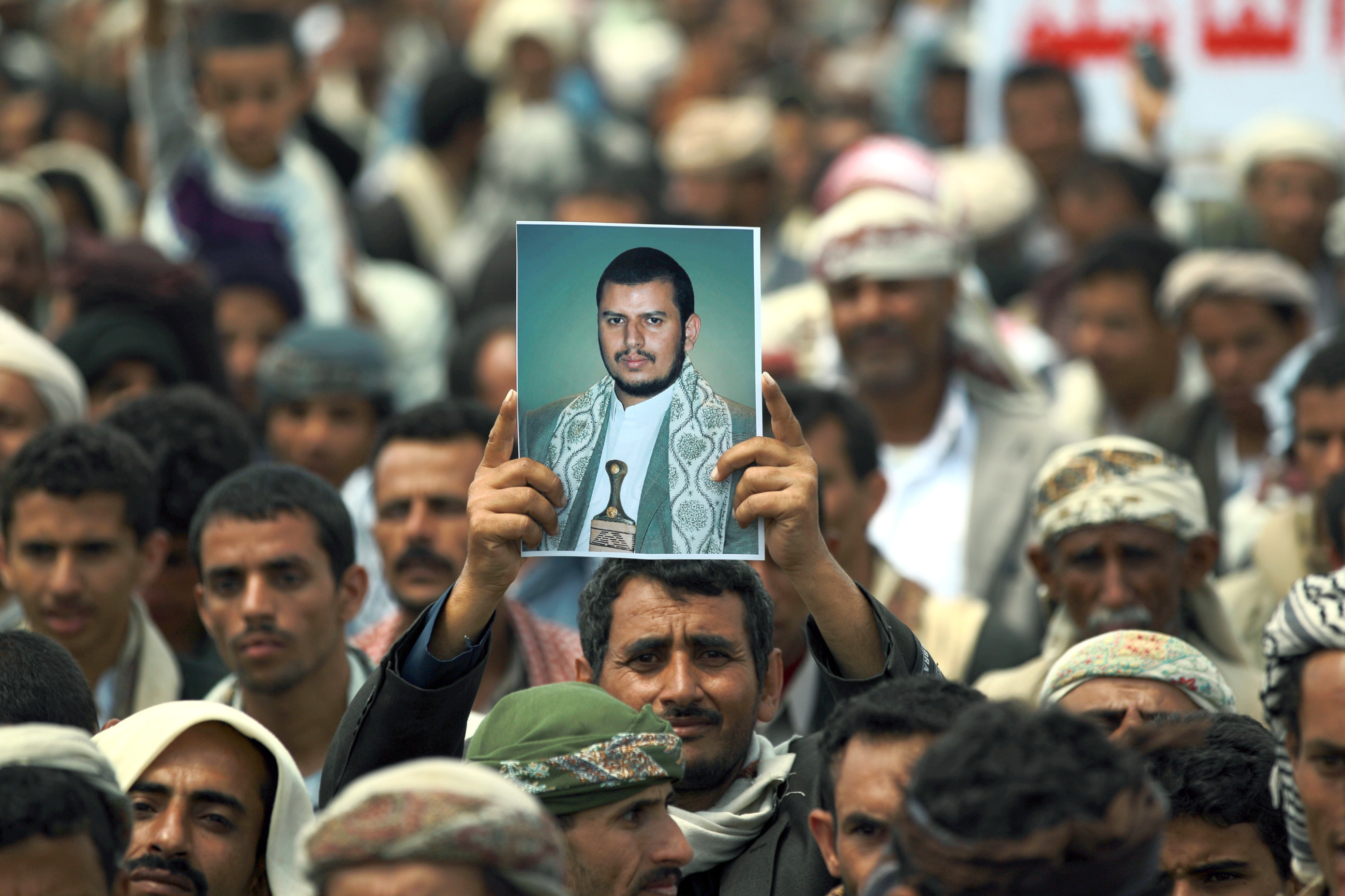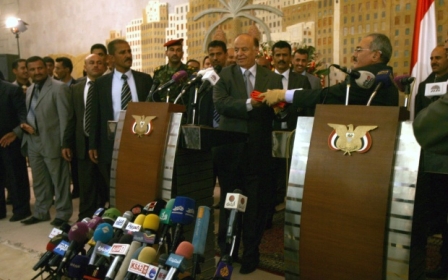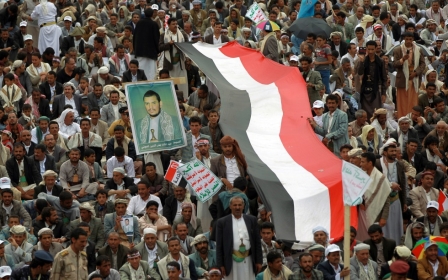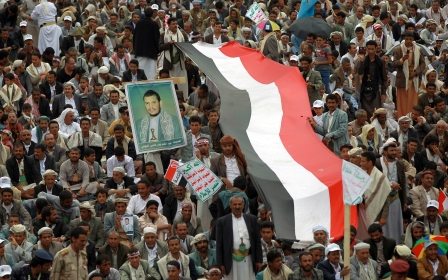Abdel-Malek al-Houthi: from shadow rebel leader to kingmaker

When news broke that Abdel-Malek al-Houthi had been killed in an airstrike in 2009 Yemeni officials breathed a quiet sigh of relief. Al-Houthi, leader of the Houthis, a powerful Shia rebel group based in Yemen’s north, had been waging an on-off civil war with the government for six years. Hundreds of thousands of civilians had been displaced by the conflict that was threatening to spill into Saudi Arabia. With their leader out of the picture the Houthis would be severely weakened; the Yemeni government might finally regain control of its territory.
Days later a video of al-Houthi appeared on Al-Jazeera. Filmed in a dimly-lit room, the clip shows a young man with broad, sloping shoulders and a faint moustache, seated in a chair, a microphone in his hand. One of al-Houthi’s arms, braced awkwardly at his side, looks broken. He seems poised, self-assured.
“Lies,” Al-Houthi says when someone off-camera asks him about the allegations of his assassination. “The regime makes these statements to justify its massacres and the targeting of civilians, among them women and children.” Al-Houthi goes on to condemn the alliance between America and Yemen’s government who he accuses of being more loyal to foreign powers than to his people. Al-Houthi concludes his message with a warning: if the regime tries to take on the Houthis again it will fail.
The young rebel leader underestimated himself.
Today al-Houthi may be the most powerful man in Yemen. At the tender age of 32 he stands at the head of an insurrection that has shaken the government to its core. After a month of protests against rising fuel prices his fighters last week overran the capital; seizing government buildings, the central bank, defense ministry headquarters, state television office and a mansion belonging to a powerful Islamist warlord.
Yemen’s president has agreed to appoint a new prime minister and introduce fuel subsidies but the rebels have so far not backed down. What al-Houthi decides to do next – back off and agree to a ceasefire or seize power himself – could determine the fate of the transition and the balance of power in the region. Today, Yemen’s Arab revolt rests in the hands of a man about whom little is known and who, in the space of a few years, has transformed himself from a shadow rebel leader into a kingmaker. How did he do it?
Abdel-Malek al-Houthi was born in 1982 in the northern province of Saadah close to the border with Saudi Arabia. The youngest of eight brothers al-Houthi grew up under the close tutelage of his father, Badreddin al-Houthi, a prominent religious scholar of Yemen’s minority Zaydi Shia sect (Zaydis, a majority in Saadah, make up around 30% of the population).
Al-Houthi’s older brother Hussein, a member of parliament who founded the Houthis in 2004 - a movement aimed at strengthening Zaidi rights and providing educational and social services - was a vocal critic of Saleh and his perceived pro-American stance after 9/11.
In 2004 the government accused Hussein of setting up unlicensed religious centers and trying to install a Shiite theocracy in the north of the country, offering up a bounty of $55,000 for his capture and launching an operation aimed at stamping out his alleged rebellion in the north.
When Hussein was killed by security forces trying to arrest him later that year Abdel-Malek was called on to lead the military effort against the government. The 23-year-old proved himself a strong field commander and a shrewd tactician. Using his knowledge of Saadah’s terrain - rugged mountains and frequent sand storms - al-Houthi repeatedly held off advances by regime forces.
When his father passed away in 2005, al-Houthi became leader of the movement. But it wasn’t until the 2011 Arab Spring uprising, analysts say, that he began to embrace his role as leader.
“If you look at Abdel-Malek’s speeches before 2011 they were essentially rants - anti-American, anti-Saudi Arabia - calling for the religious rights of Zaydis, he was preaching to the converted,” said Fernando Carvajal, a former Yemen-based NGO consultant who studied the Houthis.
“After the uprising he began addressing the nation, talking about shared injustices, the price of fuel, drone strikes. He’s gained a lot of confidence. Nowadays he speaks clearly and with purpose, he doesn’t beat around the bush.”
In a 2011 speech entitled “The Creative Revolution” al-Houthi accused Barack Obama of having attempted to create a new Middle East through “the weapon of sectarianism, only to be foiled by the Arab Spring.” In another speech he accuses Saudi Arabia of fomenting divisive sectarianism and tribalism in the region.
Al-Houthi rarely gives interviews to local or international press. When contacted by Middle East Eye Ali al-Emad, a spokesman for the Houthis, declined to arrange an interview, citing fears about al-Houthi’s safety.
“Anyone who is powerful in Yemen, who opposes the presidency, is at threat. But our sheikh is in a safe place," al-Emad said. "The regime cannot touch him.”
(Video by Mary Atkinson)
Al-Houthi lives on the move, between a series of heavily-fortified safe-houses, according to Nawal Al-Maghafi, a Yemeni journalist who visited Saada in 2011.
Al-Maghafi had arranged to interview al-Houthi for a documentary she was making for the Iranian channel Press TV but was told minutes before he was due to arrive that the meeting was cancelled.
“His guards said it was too dangerous for him to meet me. Several members of his family have been targeted. Apparantly he doesn’t trust anyone,” al-Maghafi said.
Frequently compared to Hasan Nasrallah, spiritual leader of the Lebanese paramilitary organisation Hezbollah, Al-Houthi has gained a large following of young, devout men who, analysts say, look up to him as a figure of religious and political authority.
“After decades of old men ruling, al-Houthi represents a new face in the Yemeni political scene,” said Abdul-Ghani al-Iryani, a Yemeni analyst. “His politics are conservative and his campaigns are often violent but he’s a fresh face. A young man matched with power and assertiveness.”
Hossein al-Bokhaiti, a 28 year-old student from Sana’a who has taken part in recent protests organized by the Houthis echoed the sentiment.
“If you look at Yemeni leaders in the ruling party and the opposition they are all old guys, your grandfather’s age. This man is new, he’s young,” said al-Bokhaiti, speaking to Middle East Eye via Skype.
“Everyone in Yemen knows that the revolution failed but he is the only one brave enough to stand up and say it. It's the non-urban youth in Yemen who look up to him.”
On Wednesday al-Houthi addressed the nation. In a rousing speech that was broadcast on several channels in Yemen, he spoke of a second revolution and promised to address the grievances of Yemen’s many disparate groups.
“Fuel subsidies will be restored and economic reforms will be implemented. Yemenis will not allow despots to rule the country again,” al-Houthi said, wagging his finger at the camera, a Palestinian scarf draped across his shoulders.
“We would rather he remains our leader, a spiritual leader,” said al-Bokahiti when asked whether he would like to see al-Houthi rule Yemen. “When you run as president you can only stay in power for two terms. Better to stay above politics.”
New MEE newsletter: Jerusalem Dispatch
Sign up to get the latest insights and analysis on Israel-Palestine, alongside Turkey Unpacked and other MEE newsletters
Middle East Eye delivers independent and unrivalled coverage and analysis of the Middle East, North Africa and beyond. To learn more about republishing this content and the associated fees, please fill out this form. More about MEE can be found here.




